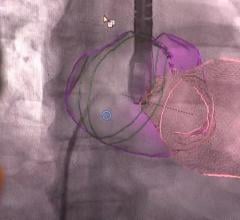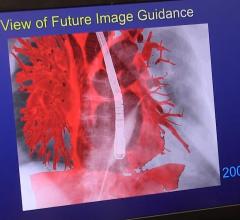
April 28, 2014 — John C. Lincoln North Mountain Hospital in Phoenix is the first in Arizona, and only one of eight hospitals in the United States, to reduce or eliminate radiation for minimally invasive cardiac procedures utilizing MediGuide technology.
MediGuide is a 3-D navigation system intended for the evaluation of vascular and cardiac anatomy on a recorded fluoroscopic image instead of live fluoroscopy. Procedures using MediGuide include patients with cardiac arrhythmias such as atrial fibrillation, cardiac resynchronization therapy (CRT), and device implantations such as pacemakers and defibrillators.
"I am pleased that John C. Lincoln invested in this technology to create optimal outcomes for patients with safety at top of mind," said Mark Seifert, M.D., electrophysiologist at John C. Lincoln North Mountain Hospital. "MediGuide is the only real-time cardiac navigation system to allow for reduced fluoroscopy during cardiac procedures."
Traditionally, fluoroscopy is used in electrophysiology (EP) labs for catheter manipulation during cardiac procedures. Fluoroscopy can result in relatively high radiation doses, especially for complex interventional procedures.
MediGuide uses low-powered electromagnetic signals to locate a miniature sensor, which is placed in the tip of the catheter, much like GPS technology drivers use to determine the location of their vehicle on a map. MediGuide provides physicians with the precise position of the sensor-enabled catheters and tools to create recorded images within the cardiac anatomy. The use of recorded images allows physicians to reduce radiation exposure during cardiovascular procedures. In particular procedures, radiation exposure can be nearly eliminated.
"Risks associated with fluoroscopy can include radiation burns to skin and underlying tissue and radiation-induced cancers, which may occur sometime later in life," added Seifert.
For more information: www.jcl.com/heart


 January 18, 2022
January 18, 2022 






